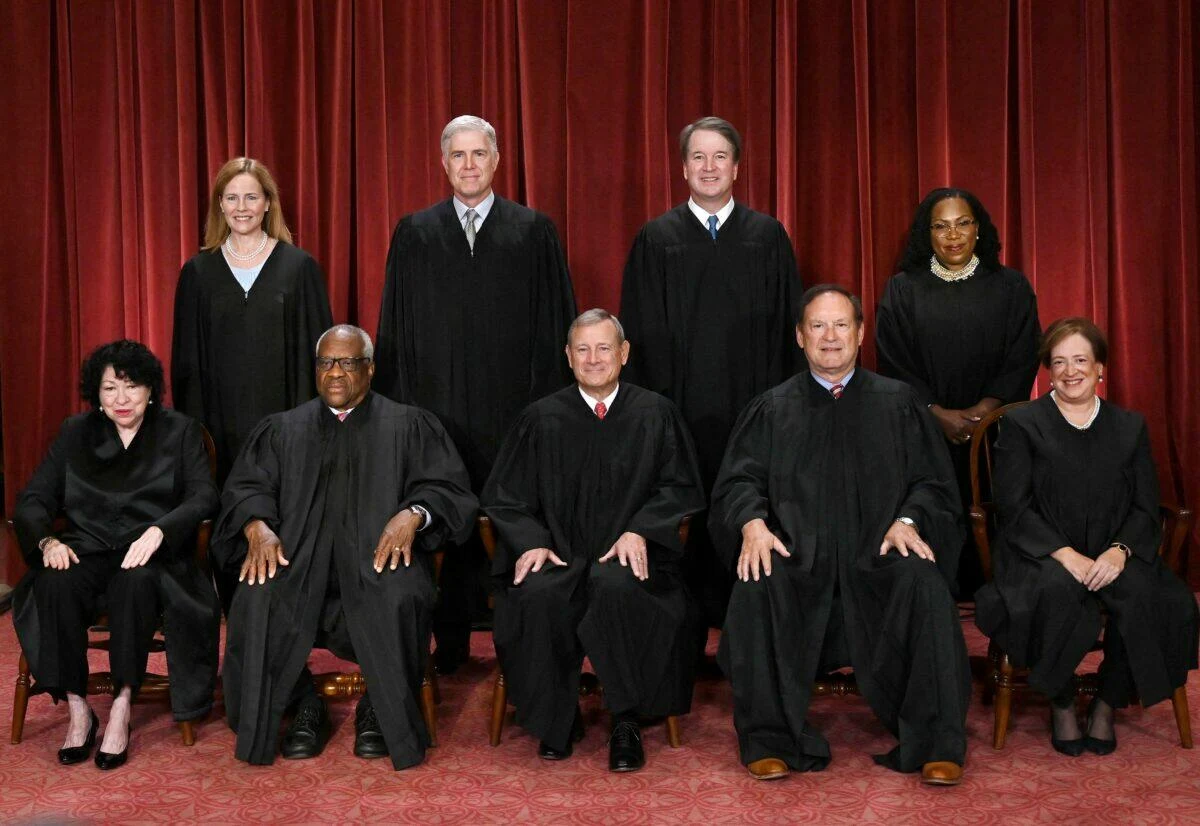Authored by Jack Phillips via The Epoch Times (emphasis ours),
The US Supreme Court on Wednesday sided with the state of Illinois over a strict new gun control law, denying an emergency request for an injunction.
 |
| Justices of the US Supreme Court pose for their official photo at the Supreme Court in Washington on Oct. 7, 2022. (Olivier Douliery/AFP via Getty Images) |
The measure, which bans what the state considers "assault weapons," will remain intact while the case brought by an Illinois gun store owner works its way through lower courts. The owner filed a petition with the high court to block the ban on a wide variety of firearms as well as "large capacity" magazines.
No explanation was given for the denial by Justice Amy Coney Barrett.
The case is currently in front of the U.S. Court of Appeals for the 7th Circuit, which is based in Chicago. The decision is likely to be appealed regardless of the outcome.
More viaThe Epoch Times (emphasis ours),
In a separate case, a federal judge blocked the gun law. However, the 7th Circuit Court has placed that decision on hold in the meantime.
The 7th Circuit appeals court also has expedited consideration of at least five different cases challenging the Illinois law. Meanwhile, the state Supreme Court is considering a similar lawsuit against the measure.
Earlier this year, the state enacted the “Protect Illinois Communities Act” that bars the purchase, sale, delivery, and manufacture of so-called assault weapons and magazines that hold more than 10 rounds. It specifically named AK-47-style rifles and AR-15-style rifles as “assault weapons” under the law, which also requires those who previously purchased semi-automatic rifles to register their ownership with Illinois State Police.
According to an FAQ of the law, “No, Illinois residents cannot purchase an AR-15 or assault weapon beginning January 11, 2023, unless subject to one of the narrow exemptions.” The FAQ also states that the law bans “a magazine, belt, drum, feed strip, or similar device that has a capacity of, or that can be readily restored or converted to accept, more than 10 rounds of ammunition for long guns and more than 15 rounds of ammunition for handguns; or any combination of parts from which a device described can be assembled.”
Illinois Gov. J.B. Pritzker, a Democrat, signed the bill into law.
“For the past four years, my administration and my colleagues in the State Capitol have been battling the powerful forces of the NRA to enshrine the strongest and most effective gun violence legislation that we possibly can,” he said. “I couldn’t be prouder to say that we got it done. And we will keep fighting—bill by bill, vote by vote, and protest by protest—to ensure that future generations only hear about massacres like Highland Park, Sandy Hook, and Uvalde in their textbooks.”
Legal Challenges
Second Amendment advocate groups have repeatedly criticized the law as unconstitutional, and gun rights activists, including Robert Bevis, a gun store owner in Naperville, filed lawsuits to block the state law as well as a similar local ordinance that was passed in the city of Highland Park. Those laws were sparked following last July’s mass shooting at a Highland Park Fourth of July parade that left multiple people dead.
“The challenged laws ban arms commonly possessed by law-abiding citizens for lawful purposes. Heller’s central holding is that a categorical ban on arms held by law-abiding citizens is unconstitutional,” his lawyers wrote to the 7th Circuit judges last month, referring to a 2008 ruling by the Supreme Court on the landmark District of Columbia v. Heller case, in which the high court found that a District law regulating gun ownership to be unconstitutional.
Contending that Bevis’s constitutional rights were violated, his lawyers added: “One would suppose that the district court would apply the Heller test or, failing that, at least explain why it believed the test is not applicable. The district court did neither. It erred when it simply ignored Heller’s central holding. Nowhere in its opinion does it apply, or even acknowledge, Heller’s holding in this regard.”